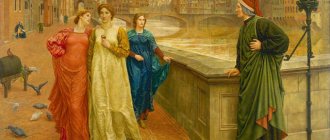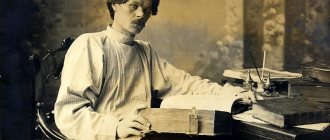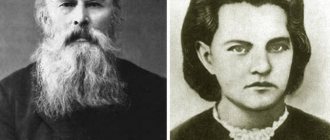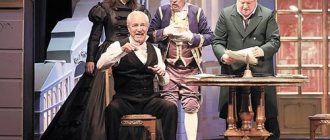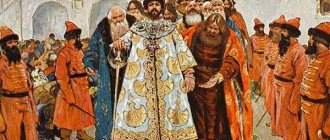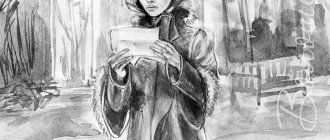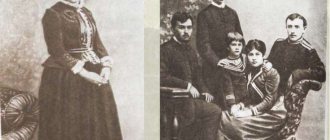Mozart and Salieri (A.S. Pushkin)
Scene I
Room.
Salieri
Everyone says: there is no truth on earth. But there is no truth - and beyond. For me it's as clear as a simple scale. I was born with a love of art; As a child, when the organ sounded high in our ancient church, I listened and listened - involuntary and sweet tears flowed. I rejected idle amusements early; Sciences alien to music were hateful to me; stubbornly and arrogantly I renounced them and devoted myself to music alone. The first step is difficult and the first path is boring. I overcame early adversity. Craft I set as the foundation of art; I became a craftsman: I gave obedient, dry fluency to my fingers and fidelity to my ear. Having killed the sounds, I tore apart the music like a corpse. I believed harmony with algebra. Then I already dared, experienced in science, to indulge in the bliss of a creative dream. I began to create; but in silence, but in secrecy, not daring to think about glory yet. Often, after sitting in a silent cell for two or three days, forgetting both sleep and food, having tasted delight and tears of inspiration, I burned my work and coldly watched as my thoughts and sounds, born by me, disappeared, blazing, with light smoke. What am I saying? When the great Gluck appeared and revealed to us new secrets (Deep, captivating secrets), Didn’t I abandon everything that I knew before, What I loved so much, what I believed so fervently, And didn’t I cheerfully follow him Uncomplainingly, like one who was mistaken And was he sent by someone he met in a different direction? With strong, intense constancy I finally reached a high degree in boundless art. Glory smiled at me; I found consonances with my creations in the hearts of people. I was happy: I peacefully enjoyed My work, success, glory; also through the labors and successes of my friends, my comrades in the wondrous art. No! I have never known envy, Oh, never! - below, when Piccini was able to captivate the ears of wild Parisians, Below, when for the first time I heard Iphigenia’s initial sounds. Who will say that the proud Salieri would ever be a despicable envier, a snake trampled by people, alive, gnawing sand and dust powerlessly? Nobody!.. And now - I’ll say it myself - I’m now an Envious person. I envy; I am deeply, painfully jealous. - Oh heaven! Where is rightness when a sacred gift, When an immortal genius is not sent as a reward of burning love, selflessness, work, diligence, prayers - but illuminates the head of a madman, idle revelers?.. Oh Mozart, Mozart!
Mozart enters.
Mozart
Yeah! you saw! but I wanted to treat you with an unexpected joke. Salieri You are here! - How long ago?
Mozart Now. I was coming to you, I had something to show you; But, passing in front of the tavern, I suddenly heard a violin... No, my friend, Salieri! You've never heard anything funnier... A blind violinist in a tavern Played out voi che sapete. Miracle! I couldn’t stand it, I brought the violinist to treat you to his art. Come in!
A blind old man enters with a violin.
Something from Mozart for us! The old man plays an aria from Don Juan; Mozart laughs. Salieri And can you laugh?
Mozart Ah, Salieri! Are you really not laughing yourself?
Salieri No. I don’t find it funny when a worthless painter stains Raphael’s Madonna for me, I don’t find it funny when a despicable buffoon dishonors Alighieri with a parody. Let's go, old man.
Mozart Wait: here you go, Drink to my health. The old man leaves. You, Salieri, are not in a good mood today. I will come to you at another time.
Salieri What did you bring me? Mozart
No - yes; trifle. The other night I was tormented by my insomnia, and two or three thoughts came into my head. Today I sketched them. I wanted to hear your opinion; but now You have no time for me.
Salieri Ah, Mozart, Mozart! When am I not interested in you? Sit down; I'm listening to.
Mozart (at the piano) Imagine... who? Well, at least I’m a little younger; In love - not too much, but slightly - With a beauty, or with a friend - even with you, I am cheerful... Suddenly: a grave vision, Sudden darkness or something like that... Well, listen. (Plays.)
Salieri You came to me with this And could stop at the inn And listen to the blind violinist! - God! You, Mozart, are unworthy of yourself.
Mozart
So, is that good?
Salieri What depth! What courage and what harmony! You, Mozart, are a god, and you don’t know it yourself; I know I am.
Mozart Bah! right? maybe... But my deity got hungry.
Salieri
Listen: we will dine together at the Golden Lion tavern.
Mozart Perhaps; I'm glad. But let me go home and tell Zhenya not to wait for me for dinner. (Leaves.)
Salieri I'm waiting for you; look. No! I cannot resist the fate of my Fate: I was chosen to Stop it - otherwise we all perished, We are all priests, ministers of music, I am not alone with my dull glory... What good will it do if Mozart is alive and still reaches new heights? Will he elevate art? No; It will fall again as he disappears: He will not leave us an heir. What's the use of it? Like some cherub, He brought us several songs of heaven, So that, having outraged the wingless desire In us, the children of the dust, he could then fly away! So fly away! the sooner the better. This is poison, the last gift of my Izora. For eighteen years I have carried it with me - And often since then life has seemed to me like an unbearable wound, and I often sat with a careless enemy at the same meal, And I never bowed to the whisper of temptation, although I am not a coward, Although I feel the offense deeply, Even if it is little I love life. I still hesitated. How the thirst for death tormented me, Why die? I imagined: perhaps life will bring me unexpected gifts; Perhaps delight will visit me And a creative night and inspiration; Perhaps the new Hayden will create the Great - and I will enjoy it... As I feasted with the hated guest, Perhaps, I imagined, I would find my worst enemy; perhaps the worst insult will strike me from an arrogant height - Then you will not be lost, the gift of Izora. And I was right! and finally I found my enemy, and the new Hayden wonderfully intoxicated me with delight! Now is the time! cherished gift of love, Move into the cup of friendship today.
Scene II
A special room in a tavern; piano. Mozart and Salieri at the table.
Salieri
Why are you cloudy today?
Mozart Me? No! Salieri Are you really upset about something, Mozart? A good dinner, nice wine, And you are silent and frowning.
Mozart Frankly, My Requiem worries me.
Salieri A! Are you composing Requiem? How long ago? Mozart A long time ago, about three weeks. But a strange case... I didn’t tell you?
Salieri No. Mozart So listen. About three weeks ago, I came home late. They told me that someone came for me. Why - I don’t know. All night I thought: who could it be? And what does he need in me? The next day the same one came in and didn’t find me again. On the third day I played on the floor with my boy. They called me; I went out. A man dressed in black bowed politely, ordered Me a Requiem and disappeared. I sat down immediately and began to write - and from that time on my black man did not come for me; And I’m glad: I would be sorry to part with my work, even though Requiem is completely ready. But meanwhile I...
Salieri What? Mozart
I'm ashamed to admit this...
Salieri What? Mozart
My black man gives me no rest day and night. He follows me everywhere like a shadow. And now it seems to me that he is the third one sitting with us.
Salieri And, that's enough! What kind of childish fear is this? Dispel your empty thoughts. Beaumarchais told me: “Listen, brother Salieri, when dark thoughts come to you, open a bottle of champagne or re-read The Marriage of Figaro.”
Mozart
Yes! Beaumarchais was your friend; You composed “Tarara” for him, a glorious thing. There is one motive... I keep repeating it when I'm happy... La la la la... Oh, is it true, Salieri, that Beaumarchais poisoned someone?
Salieri
I don’t think so: he was too funny for such a craft.
Mozart He's a genius, like you and me. And genius and villainy are two incompatible things. Isn't it true?
Salieri
You think?
(Throws poison into Mozart's glass.)
Well, drink up. Mozart For your Health, friend, for a sincere union, Linking Mozart and Salieri, Two sons of harmony.
(Drinks.)
Salieri Wait, wait, wait!.. Did you drink... without me?
Mozart
(throws the napkin on the table)
Enough, I'm full.
(Goes to the piano.)
Listen, Salieri, My Requiem.
(Plays.) Are you crying? Salieri I'm shedding these tears for the first time: both painful and pleasant, As if I had committed a heavy duty, As if a healing knife had cut off my suffering member! Friend Mozart, these tears... Don't notice them. Continue, hurry to fill my soul with sounds...
Mozart
If only everyone felt the power of Harmony like this! But no: then the world could not exist; no one would take care of the needs of low life; Everyone would indulge in free art. We are a few chosen ones, happy idle ones, Neglecting the despicable benefits, One beautiful priests. Isn't it true? But I’m not well today, something’s hard for me; I'll go to sleep. Goodbye!
Salieri Goodbye. (Alone.) You will fall asleep for a long time, Mozart! But is he really right, And am I not a genius? Genius and villainy Two things are incompatible. Not true: What about Bonarotti? Or is this a fairy tale of the Dumb, senseless crowd - and the creator of the Vatican was not a Murderer?
Summary
Scene 1
Salieri recalls how once, while still a child, he heard the sound of a church organ. The music impressed the boy so much that from then on he devoted his life to it, completely rejecting “idle fun.”
For Salieri, art was like a craft. He, “having killed the sounds,” “disintegrated the music like a corpse,” and learned harmony as a science, testing it with algebra.
While creating works, Salieri often burned his works because he did not consider them talented enough. Now, thanks to many years of hard work, he reached a “high degree” and peacefully enjoyed his “success and glory.” However, Salieri is tormented by the fact that previously he did not envy other musicians, whereas now he is envious of his friend Mozart, a young idle reveler, but a brilliant composer.
Mozart comes to Salieri. The guest, wanting to “treat his friend with an unexpected joke,” brought with him a blind violinist. Mozart met the musician at a tavern, where he was playing one of his works. The composer asks the blind man to play again, and he is very amused by the violinist's inept, out-of-tune playing. Salieri was outraged by his comrade’s entertainment; he believes that spoiling brilliant music with poor performance is blasphemous. Mozart gives the violinist money and lets him go. The composer tells Salieri that at night, suffering from insomnia, he sketched a small piece. At the request of a friend, Mozart plays it. Salieri admires his friend's music:
“What depth! What courage and what harmony! You, Mozart, are a god, and you don’t know it yourself; I know I am.”
Mozart, not realizing his greatness, jokingly says that “my god is hungry.” The men agree to have lunch at the Golden Lion tavern. Mozart goes home to warn his wife.
Left on his own, Salieri thinks that he must “stop” Mozart. He takes out poison - a dying gift from his beloved Izora. Salieri carried the bottle with him for eighteen years, but, despite the fact that life often seemed unbearable to him, he still kept it. He decides to poison Mozart at dinner:
“Now it’s time! cherished gift of love, Pass today into the cup of friendship.”
Scene 2
Mozart and Salieri have lunch at a tavern. Mozart tells a friend that three weeks ago “a man dressed in black” came to see him. Having bowed politely, he ordered the composer a Requiem and disappeared. Mozart immediately sat down to work, but from that time the customer did not appear. The composer is even happy about this, since he would not want to part with his work. However, after the incident, Mozart is in constant anxiety:
“My black man gives me no rest day and night. He follows me everywhere like a shadow. And now it seems to me that he is the third one sitting with us.”
Salieri tries to dispel his friend's fears: he recalls that Beaumarchais once advised him to have fun drinking champagne or re-read The Marriage of Figaro. Mozart wonders: is it true “that Beaumarchais poisoned someone?”, but he himself does not believe it:
“He’s a genius, like you and me. And genius and villainy are two incompatible things. Isn’t it true?”
Salieri quietly drops poison into Mozart's glass and serves it to him. The composer drinks to the “sincere union that binds Mozart and Salieri,” after which he sits down at the piano and plays his Requiem. Salieri could not hold back his tears:
“I’m shedding these tears for the first time: both painful and pleasant, As if I had committed a heavy duty.”
Mozart feels unwell and goes home to sleep. Left alone, Salieri reflects on his friend’s words:
“But is he really right, And I’m not a genius? Genius and villainy Two things are incompatible. Not true: What about Bonarotti? Or is this a fairy tale of the Dumb, senseless crowd - and the creator of the Vatican was not a Murderer?

